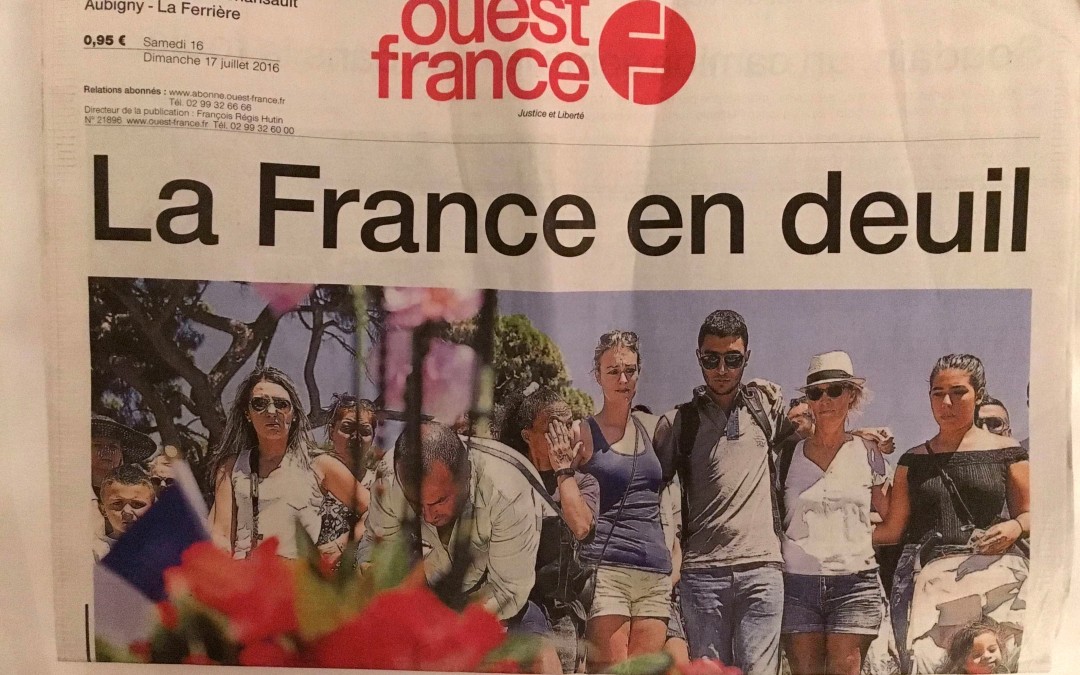Nearly a week after the recent terror attack in Nice, France, the French people are still reeling from the loss of 84 people after a man drove a truck through a crowd of spectators celebrating Bastille Day.
The chair of the English and Foreign Languages department, Dr. Kimberly Reed, was traveling in France the day of the terrorist attack. Although she was visiting Brittany, France, which is many hours away from Nice, Dr. Reed said the horror of the attack echoed all across the country.
“After the initial shock, I think there was a sort of stunned disbelief that this had happened for the third time in about 18 months (the Charlie Hebdo attack early last year, and then the Paris attacks last November),” Reed said.
Reed had spent Bastille Day at a celebration in memory of a friend who died of ALS a few years ago, so she did not find out about the terrorism until very late that night, but she, along with friends she was visiting, were sickened when they heard the news.
“When I went to my friend’s house the next morning, she and her family had just found out about the attacks. They were, of course, horrified and upset.”
Reed continued, noting that even though she was many miles away from Nice, people in Brittany and all over the country were mourning.
“I think most French people, regardless of the area they’re from, were very upset by this. They do have a strong sense of national identity, by and large, and so I think they see this as an attack on them all.”
France’s president, François Hollande, extended the state of emergency in the country, originally enacted after the attacks in Paris last November.
“We will maintain a high level of vigilance; the state of emergency will be maintained for three months,” Mr. Hollande announced.
In response to the French president’s message, Reed said that she does think it will affect some areas of life in France. However, she added, “I did not experience any problems in traveling after the attack, and I didn’t feel the need to take any extra precautions.”
“Most of the main television channels covered this non-stop from the time of the attacks, and the newspapers had extensive coverage,” Reed said.
Ouest France (France West), a regional newspaper for Brittany, Normand, and the Loire Valley, is the most-read newspaper in the French-speaking world. Its headline read, “La France en deuil,” meaning “France in mourning,” and the image was taken on the Boulevard des Anglais in Nice, where the attack occurred.
“Lots of the reporting had various experts in security or elected officials asking why security is not tight enough to prevent this sort of thing from happening, especially given the two attacks in the last 18 months,” Reed said.
Mohamed Lahouaiej Bouhlel was named as the man who committed the act of terror in Nice. On Saturday, the Islamic State of Iraq and the Levan (Isil) claimed responsibility for the attack led by Bouhlel, but French authorities have not yet verified this claim.
“I didn’t hear a word of anti-Muslim sentiment, even from people I met only in passing (in shops or restaurants),” Reed noted. “As for my French friends, they have the wisdom and education to understand that these attackers do not represent the majority of Muslims.”
Reed added, “Numerous politicians, both in France and elsewhere in Europe, are seizing this opportunity to denounce immigration policies, and are in fact often conflating immigration with terrorism done in the name of radical Islam. So there is anti-Muslim sentiment; it’s just that none of my French friends hold those beliefs.”
This upcoming fall and spring, Lipscomb will have many students traveling in Europe through the study-abroad program.
“I would tell the students about to study abroad to listen carefully when their trip leaders talk to them about safety and security,” Reed said. “Follow the advice given and focus on the wonderful experience that awaits, rather than worry about an attack.”

